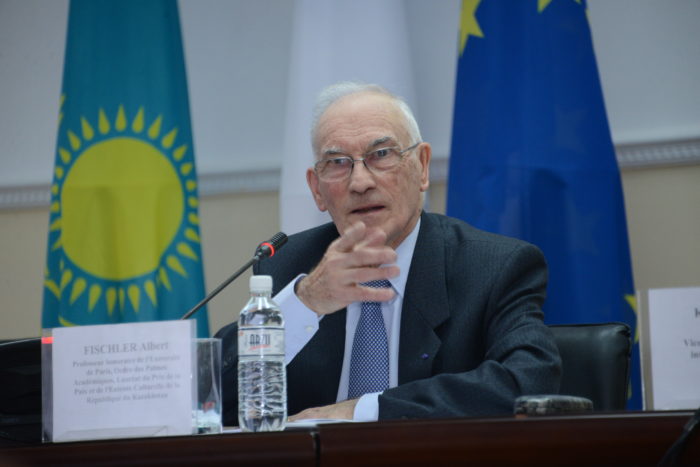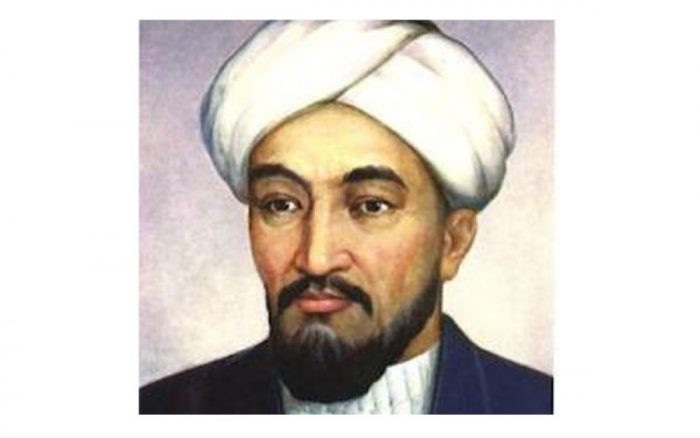As Kazakhstan celebrates the Anniversary Year of the medieval philosopher Abu Nasr al-Farabi (870-950), born on the territory of modern Kazakhstan 1150 years ago, The Astana Times is publishing series of interviews and articles from world-renowned scholars, who specialize on al-Farabi’s legacy.

Albert Fischler
The great Central Asian intellectual Abu Nasr Al-Farabi was born 1150 years ago and spent the 80 years of his lifetime (870-950 AD) in almost constant travels in the huge space between Egyptian Alexandria and those regions of Central Asia which border China.
This is a great achievement, and great men such as the Jewish philosopher Maimonides (1138-1204) stressed both the philosophical and the geographical dimensions of Al-Farabi’s legacy. Maimonides called him “the Second Master of philosophy” (the first being Aristotle himself) and said that in his search for knowledge “Al-Farabi went as far as China,” as the famous hadith suggested.
Here we need some context for the picture. Marco Polo, one of the first Europeans who brought to what we now can call the West definitive knowledge about China, would be born only 50 years after the death of Maimonides (the works by Plano Carpini from his jorney to Asia in 1245 were even more authoritative than Marco Polo’s, but the Venetian got most of the fame). So, when Maimonides talks about “China,” he talks about a legendary end of the world, something beyond the realm of human knowledge. (Oh, how much the world was bigger in the times of our forefathers, when our lonely planet had not yet been explored!)

Abu Nasr Al-Farabi
This is one of the charms of the region and one of the charms of the epoch explored: Europeans explored Asian geography, while scholars from the Islamic areas of Asia explored European philosophy. It was the time when the European monk Guillaume de Rubrouck sent in 1253 by King Louis IX of France went to the heartlands of Mongols, passing through the lands of modern Kazakhs and Kirghiz people, and bringing most authoritative of descriptions of the lands he saw. And it was the time when Aristotle was translated and preserved for European culture by Arab scholars…
But let’s return to Maimonides’ admiration for Abu Nasr Al-Farabi, whose “geographical” aspect we have tried to put in context. It should be added that when Maimonides, the most respected Jewish medieval figure, puts Al-Farabi next to Aristotle, Maimonides is showing the highest respect for the Central Asian philosopher. How could this “Eurasian provincial” Al-Farabi, most likely born in 870 next to the city of Otyrar, on the territory of modern Kazakhstan, achieve such greatness in the eyes of Maimonides? Why did this happen? Well, because for the people of the 12th century, to whom Maimonides belonged, Aristotle’s lifetime (384-322 BC) looked like an age of giants. Archeology, which brought the daily lives of Greeks closer to us, was not yet a science then. What remained of that age of giants of antiquity in the Middle Ages were just a few cherished texts from Aristotle and Plato. They were for Maimonides not matters of abstract knowledge, but the bridge to a better, more enlightened world.
And Abu Nasr Al-Farabi’s translations from Aristotle and Plato were definitely valuable elements of this bridge of knowledge. (Al-Farabi definitely spoke and read Arabic and Greek, but his native language was Turkic, and he devoted his life to facilitating the passage of knowledge between the scholars of all these three language groups.)
But can geography, philosophy or even science in general help someone born 1150 years ago to prolong the memory of one’s name across the epochs, ages and centuries? There is something about Al-Farabi, that makes him intimately precious to us, that helps us identify with him. I ask myself the question – what was it? He saved science, he helped human knowledge go through hard times and overcome oblivion. And when we learn about someone saving books and knowledge, we immediately feel a pang of sympathy. The history of the twentieth century taught us how right was the German poet of the nineteenth century poet Heinrich Heine, when he coined that maxim: “Where they burn books, they will burn also people.”
When in 529 AD it seemed that the ancient philosophy was doomed to oblivion after the philosophical School of Athens was shut down by the Byzantine emperor Justinian, the students of Greek scholars exiled by Justinian found refuge in the Abbasid Caliphate. There the works of ancient Greek philosophers were translated into Syriac and later Arabic languages. And this was done by several generations of (who could expect such a thing then?) Moslem scholars from various lands, including Central Asia. They translated and preserved the ancient Greek knowledge, and Al-Farabi was one of these translators. So, Abu Nasr Al-Farabi was an early precursor of what we call now “international science without borders.”
But do we love Al-Farabi for saving knowledge alone? No. Sanctified knowledge becomes ossified. His reflections on ancient Greek science were not only respectful, but also critical. Some of his reflections on it may seem abstract and outdated to a modern mind: Al-Farabi was a passionate classificator of sciences and he was absorbed by the need to reconcile Plato’s and Aristotle’s views on religion and science. This problem seems to have been resolved a long time ago, but let’s put it this way: is science always moral (in the Middle Ages “religious” was a synonym of “moral”)? The answer is of course not always positive, to put it mildly. We are still searching for this combination of morality and science, and in the same way Al-Farabi searched for a right “balance” of faith and knowledge in his days, in his native Islamic world. Al-Farabi did not question Islam, but he made every effort to enrich it by science. He was a Moslem scholar who was a passionate lover of European knowledge.
It must be said that this love was not always unrequited. Abu Nasr Al-Farabi was praised by Pico della Mirandola in the 15th century and in the 14th century by Dante. And a well known French philosopher of the twentieth century, Etienne Gilson, put it this way:
“Without Al-Farabi the understanding of St. Thomas of Aquinas would be difficult.”
St. Thomas of Aquinas, the father of the Catholic religious doctrine, what does he have to do with a Moslem thinker, who was born and died in the depths of Eurasia, thousands of miles away from Aquinas (located in present day Lazio, Italy)? The trick is that in his book “Kitab al Milla” Al-Farabi writes not about Islam in particular, but about religion in general. And the problem of reconciling religion with Aristotelean philosophy is central to both Al-Farabi and St. Thomas of Aquinas.
The aroma of times, for some romantic souls it means a lot more than the authority of the name, even if Abu Nasr Al-Farabi’s “credentials” include the names of Thomas of Aquinas and Dante. Well, Al-Farabi can provide plenty of that aroma of distant epochs. His was the epoch of Enlightened Islam. From the beginning of the Abbasid dynasty in the 8th century, two caliphs, Al-Mansur and Al-Mahdi, advocated the study of science in order to affirm their political ad spiritual power. They fought separatism not by force alone, but also by incorporating the precious Sassanid culture and Zoroastrian revelations into the life of their Caliphate. They relied on the famous hadith:
“The ink of a scientist is more precious than even the blood of a martyr.”
What a poetic way to summarize the life of Abu Nasr Al-Farabi and the reasons why we love him.
The author is Honorary Professor, Officer in the Order of Academic Palms, Laureate of the Prize for Peace and Cultural Understanding of Kazakhstan.

